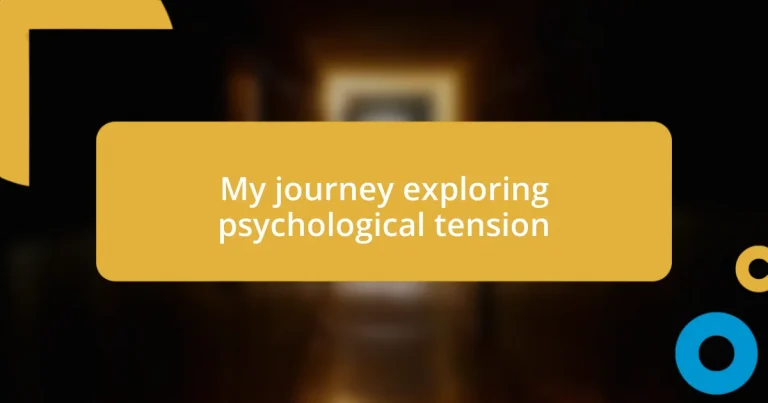Key takeaways:
- Psychological tension stems from the conflict between personal desires and societal expectations, often leading to anxiety and stress.
- Recognizing contributing factors such as unrealistic expectations, fear of change, and social comparison is crucial for managing psychological tension effectively.
- Long-term strategies like establishing routines, nurturing supportive relationships, and setting boundaries can significantly reduce psychological tension and promote well-being.
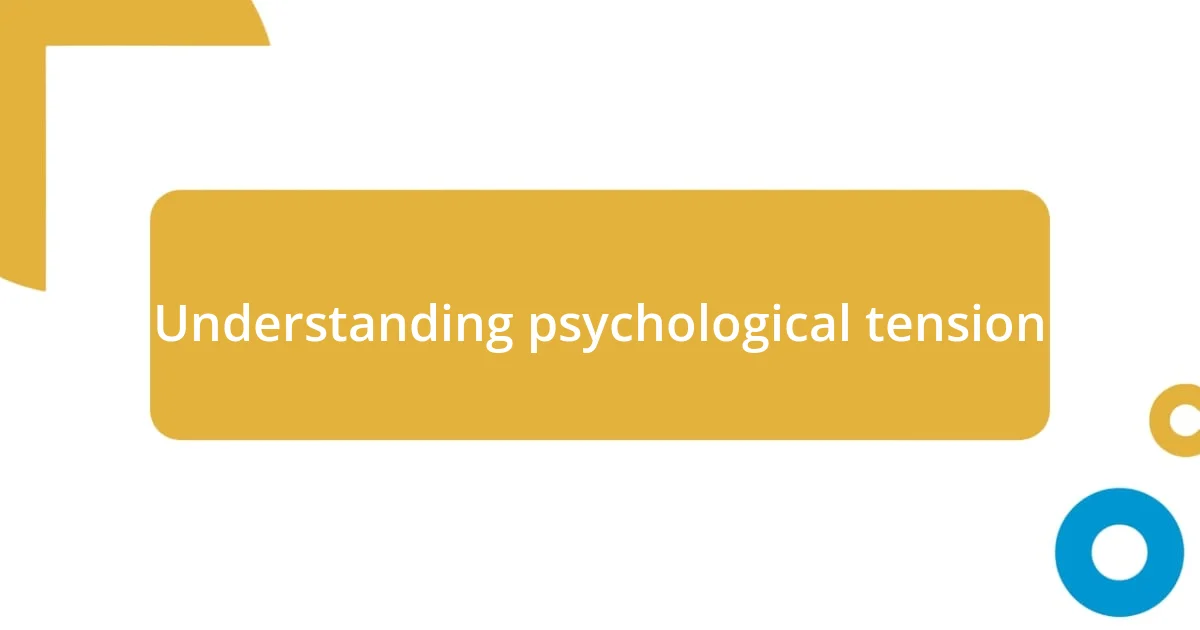
Understanding psychological tension
Psychological tension often arises from the conflict between our desires and reality. I remember a time when I desperately wanted to pursue a career in the arts, but societal expectations tugged at me to take a more “practical” path. Isn’t it fascinating how these internal struggles can shape our decisions and feelings?
This tension can manifest as anxiety or stress, impacting our everyday lives. When I experienced a significant life transition, I found myself caught in a whirlwind of fear and excitement. Have you ever felt that way? The push and pull of these emotions can be overwhelming, yet they also signal growth and transformation.
Understanding psychological tension involves recognizing its sources and accepting that it’s a normal part of being human. I often remind myself that these feelings can lead to insightful revelations as long as we take the time to reflect on them. So, how can we use psychological tension as a catalyst for personal growth rather than a source of distress?
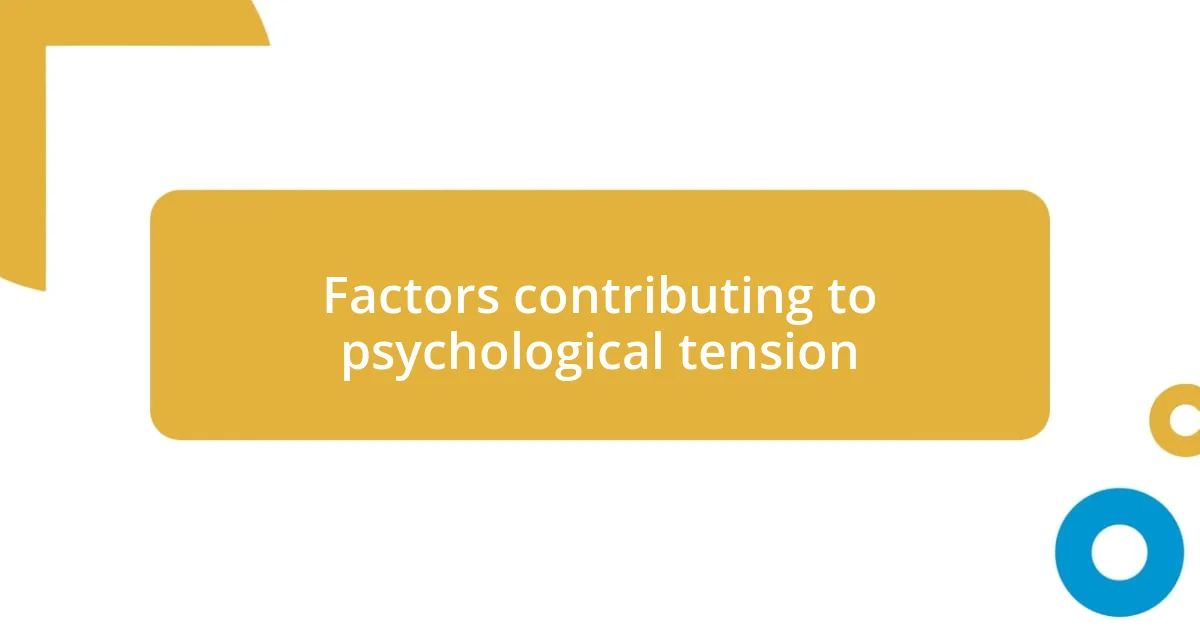
Factors contributing to psychological tension
Psychological tension is influenced by several intertwined factors that often lurk beneath the surface. For instance, my own experience during a demanding job transition revealed how external pressures—like expectations from family or society—can heighten feelings of inadequacy. It’s disheartening when what you want doesn’t align with what is expected of you, and it’s easy to feel trapped in a cycle of stress and discomfort.
Here are some key factors that contribute to psychological tension:
- Unrealistic Expectations: Imposed by self or others, leading to constant dissatisfaction.
- Fear of Change: The anxiety surrounding the unknown can prevent us from embracing new opportunities.
- Social Comparison: Measuring ourselves against peers can create feelings of inadequacy and self-doubt.
- Conflict of Values: When personal values clash with societal norms, the resulting tension can be palpable.
- Life Stressors: Events such as job loss, relationship troubles, or health issues can significantly amplify psychological tension.
In my own life, I’ve noticed that when I fail to honor my values, the internal conflict it creates can be dizzying. I once chose to ignore my passion for writing in favor of a more stable job, which led to feelings of unfulfillment. Recognizing these contributing factors is a crucial first step in managing psychological tension effectively.
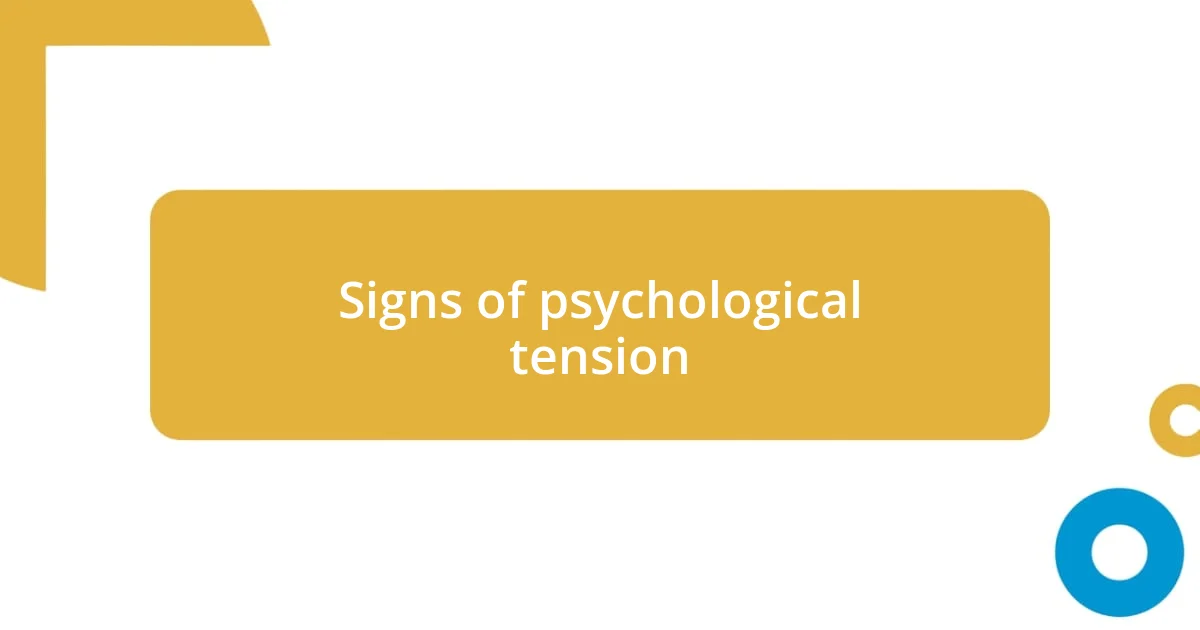
Signs of psychological tension
Psychological tension often reveals itself through various signs that can be both subtle and pronounced. For instance, I’ve noticed that chronic fatigue can creep in, a sign I ignored for too long. It’s interesting how our bodies send us messages; when I was grappling with conflicting ambitions, even simple tasks felt exhausting. Have you ever felt that way, where just getting out of bed seems like a monumental task?
Similarly, emotional outbursts can be a clear indicator of underlying tension. I vividly remember a moment when I lashed out at a friend over a trivial matter. In hindsight, it was my stress manifesting itself; trivial annoyances became mountains in the backdrop of my turbulent thoughts. It’s a harsh reminder that our emotional responses often reflect deeper psychological struggles.
Physical symptoms, such as headaches or a racing heart, can also signal psychological tension. I had a period where my heart would race at every little stressor, leaving me feeling out of control. Recognizing these signs is crucial in addressing the tension before it escalates. Being self-aware can transform our experiences and reactions into growth opportunities.
| Sign | Description |
|---|---|
| Chronic Fatigue | A persistent feeling of tiredness often tied to emotional strain. |
| Emotional Outbursts | Reactions that seem disproportionate to the situation, indicating deeper conflict. |
| Physical Symptoms | Manifestations like headaches or elevated heart rate signaling stress. |
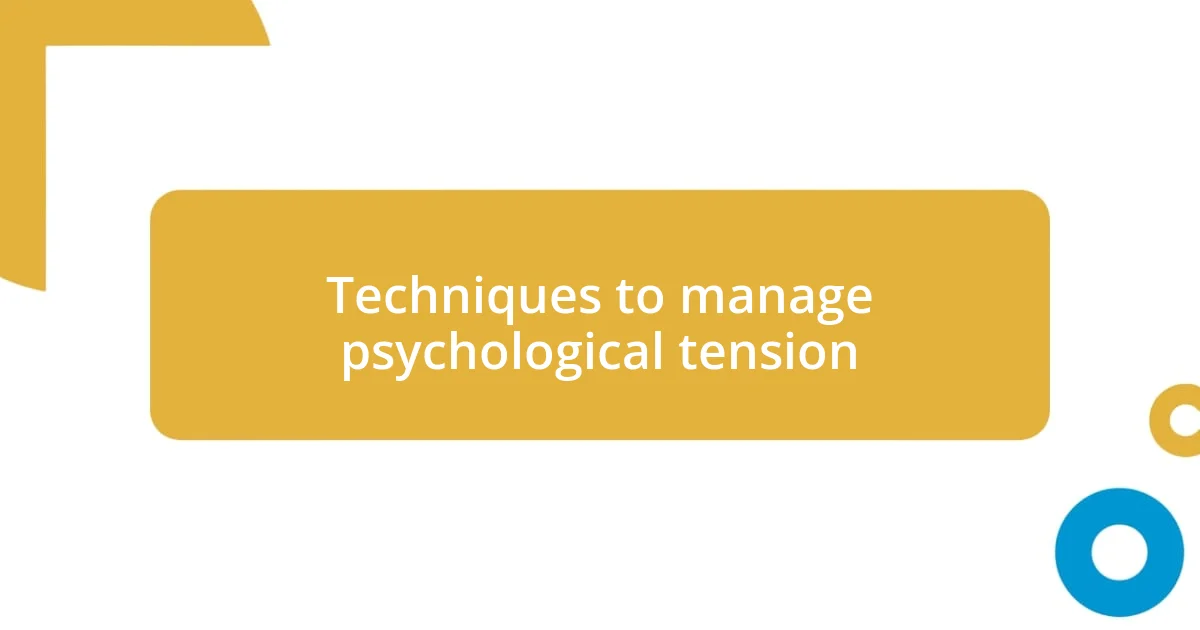
Techniques to manage psychological tension
One effective technique I’ve found for managing psychological tension is mindfulness meditation. I remember the first time I sat quietly, focusing solely on my breath; it felt strange, almost uncomfortable. Yet, with practice, I discovered that these moments of stillness allowed me to catch my racing thoughts before they spiraled. Have you ever noticed how difficult it can be to untangle your mind? By observing my thoughts without judgment, I started to appreciate them as mere passing clouds rather than overwhelming storms.
Another approach that has helped me is journaling my feelings. At first, it felt a bit tedious, but putting pen to paper became a safe space for me to process my emotions. I recall a particularly tough day where I felt crushed under the weight of expectations. Writing it all down helped me clarify my thoughts and ultimately release the heaviness. How often do we bottle up our feelings, only for them to bubble over unexpectedly? The simple act of writing provided me with clarity and a sense of relief.
Lastly, engaging in physical activity has been vital in my journey. I remember when I initially resisted going for a run after a stressful week; it felt like the last thing I wanted to do. However, I soon realized that moving my body was a tremendous outlet for tension. The rush of endorphins lifted my mood, and I often returned from a run with a refreshed perspective. Isn’t it fascinating how a little movement can shift our mental state so dramatically? Embracing these techniques has made a significant difference in how I navigate psychological tension in my life.
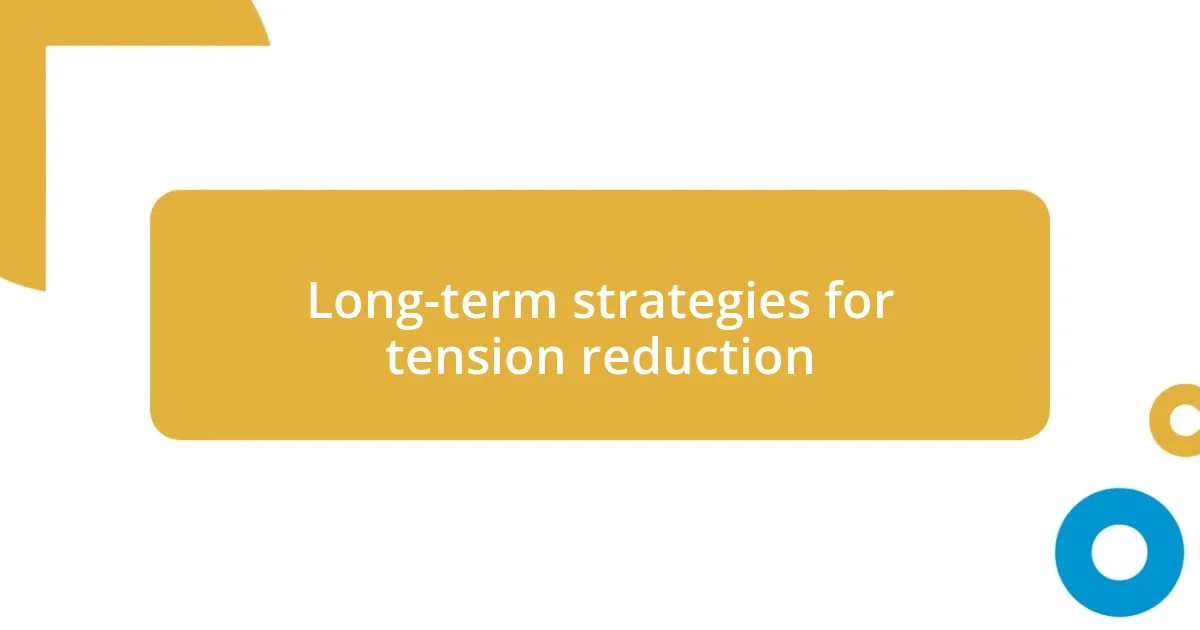
Long-term strategies for tension reduction
One long-term strategy that I’ve found helpful in reducing psychological tension is establishing a consistent daily routine. I still remember how chaotic my days felt without structure—time would slip away, and I often felt lost. By incorporating a fixed schedule, I noticed an unexpected calmness; my mornings became a sacred time for reflection, which set a positive tone for the day. Have you ever experienced the freedom that comes with knowing what to expect?
In addition to routines, nurturing connections with supportive friends or family has played a significant role in my journey. There were days when I felt like I was drowning in my own thoughts, but reaching out for a simple chat or a coffee date transformed my perspective. It’s amazing how sharing even the smallest concerns can lighten our emotional burdens. Do you have someone you turn to when the weight of the world feels heavier than usual? Those connections can truly make a difference.
Lastly, I firmly believe in the power of setting boundaries to protect my mental space. I learned the hard way that saying “yes” to everything only led to burnout. I still remember the relief I felt when I started to decline invitations that drained my energy. Establishing limits not only helped me prioritize my well-being, but it also opened up time for activities that genuinely bring me joy. Isn’t it liberating to prioritize your peace? These strategies have collectively fostered a healthier relationship with my own psychological tension.
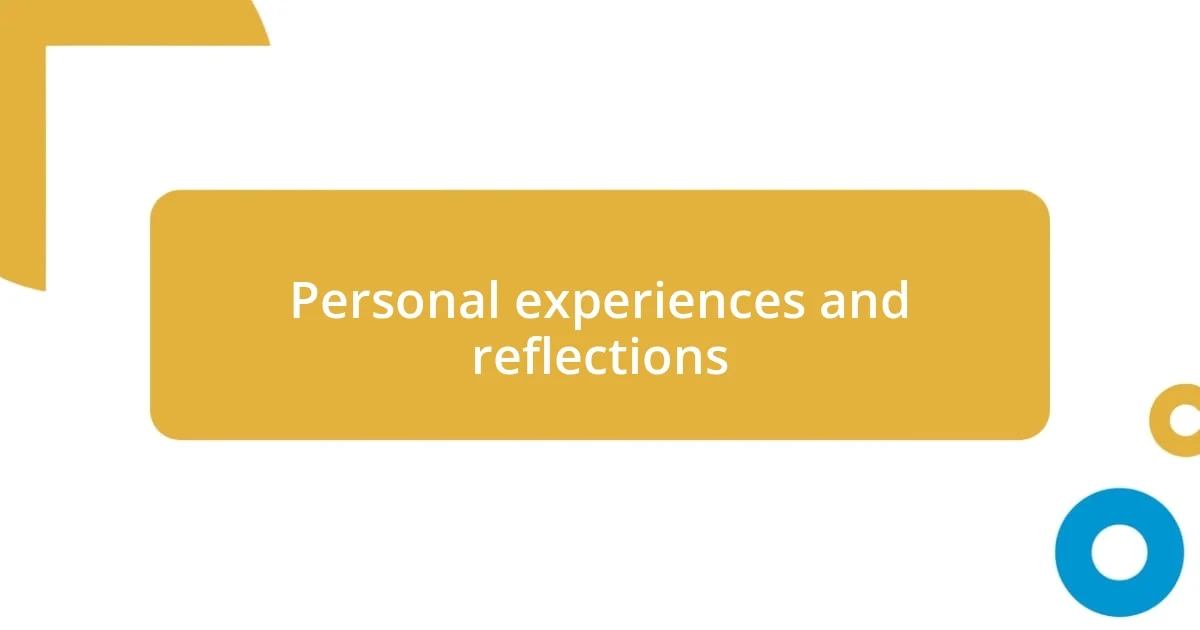
Personal experiences and reflections
Reflecting on my personal journey with psychological tension evokes a vivid mix of emotions. I recall a particularly challenging chapter when deadlines loomed, and I felt like I was constantly wearing a tight rubber band around my chest. It was during those moments that I recognized my body’s signals—my racing heart and clenched jaw were desperate calls for help. Have you felt that physical manifestation of stress? It was a real wake-up call for me, pushing me to explore the deeper connections between my mind and body.
There was a day when I found myself staring blankly at the screen, paralyzed by an overwhelming sense of anxiety. In that stillness, I decided to put aside work and take a long walk in nature. The fresh air embraced me, and as I walked, I gradually felt the weight of tension loosen from my shoulders. Isn’t it incredible how nature can remind us of our place in the world? That experience taught me that sometimes, stepping away is more productive than pushing through.
One poignant moment stands out—when I finally voiced my feelings to a trusted friend. The relief was palpable as I shared the burdens I carried; it was as if I had been holding my breath for far too long. Can you remember the last time you unburdened your heart? I realized then that vulnerability isn’t a weakness—rather, it’s a powerful gateway to understanding and healing. These reflections remind me that navigating psychological tension is often an intricate dance between acknowledgment, expression, and connection.












